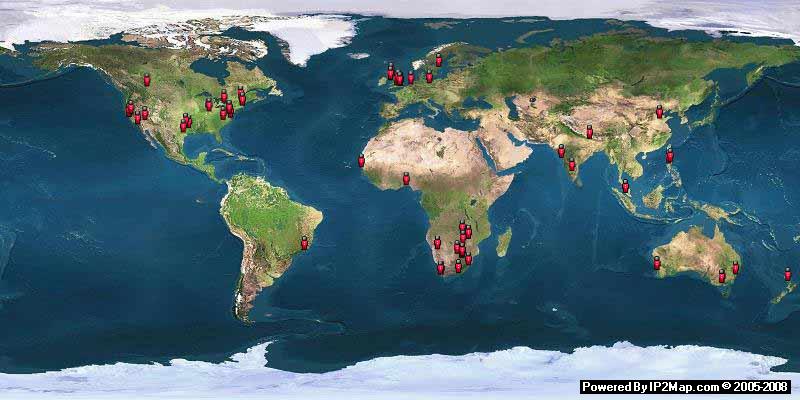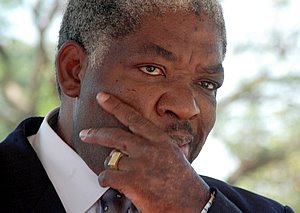http://platform.blogs.com/passionofthepresent/2007/04/you_cant_kill_j.html
Zimbabwean publisher and editor Wilf Mbanga will mark this year's World Press Freedom Day (May 3) in Britain, along with several other reporters from his country who have fled the repressive regime of President Robert Mugabe. As the political and economic difficulties gripping Zimbabwe have intensified, so have [the] government's efforts to clamp down on journalists covering the crisis.
Media is restricted in its activities by legislation, notably the 2002 Access to Information and Protection of Privacy Act (AIPPA), which requires all reporters and media organisations to register with the Media and Information Commission (MIC), controlled by government.
The law has enabled officials to take action against press outlets which have been critical of Mugabe's rule, such as Zimbabwe's sole privately owned daily -- the 'Daily News'. This paper was denied registration, and shut down in 2003.
In addition, journalists who work without MIC authorisation face legal action. But, this may be the least of the dangers facing them, as the recent abduction and murder of Zimbabwean cameraman Edward Chikomba suggests. A former employee of the state broadcaster, he was reportedly beaten to death, and his body dumped outside the capital of Harare in March.
The killing has been linked to Chikomba's alleged leaking to international media of footage showing the injuries sustained by opposition leader Morgan Tsvangirai, during a Mar. 11 prayer meeting in Harare that was violently dispersed by police. Images of the battered Movement for Democratic Change official were viewed around the world, prompting renewed criticism of the situation in Zimbabwe. Foreign correspondents are effectively blocked from working in the country.
Mbanga has responded to these challenges by editing and publishing a weekly, 'The Zimbabwean', outside his country -- then getting the papers back across the border into Zimbabwe. He spoke to IPS writer Moyiga Nduru about the difficulties faced in putting out the publication.
IPS: Where do you publish?
Wilf Mbanga (WM): We publish simultaneously in London and Johannesburg. Since the draconian AIPPA laws were promulgated in 2002, five newspapers have been closed. This makes it impossible for us to operate in Zimbabwe.
On top of that, there's a hit list of 27 names…Somebody posted a copy of the list to me; we think [that] it's a scare tactic. We scanned and published it in 'The Zimbabwean'…There are only two journalists on that list -- myself and Gift Phiri, our correspondent in Zimbabwe. The rest are politicians and civic leaders such as Morgan Tsvangirai and Lovemore Madhuku.
IPS: What's your circulation?
WM: We began with 5,000 copies in 2005. Now we distribute 40,000 copies weekly…We could send more if we had the means. The problem is transport…Interestingly, there's also demand for second-hand newspapers. People read it and sell it.
IPS: How is the newspaper delivered to Zimbabwe?
WM: We move the papers by road transport; it's expensive to transport it by air. In Zimbabwe, it's sold freely on the streets of Harare and Bulawayo.
IPS: Doesn't this indicate a certain tolerance for freedom of expression in Zimbabwe?
WM: You can't say [that] there's freedom in Zimbabwe…The government monopolises the media: it owns two dailies and four weeklies. Zimbabwe's only TV station and radio stations are owned by the government…They refused to grant licences to private radio and television stations. They have gone to the extent of confiscating radio sets in rural areas so that people cannot listen to foreign news.
IPS: Do officials tamper with your newspaper in any way?
WM: So far they haven't tampered with it, but they intimidate our vendors. Recently, a (cabinet) minister was spotted buying a copy of 'The Zimbabwean' and reading it (laughing)…There's incredible thirst for news in Zimbabwe…I have got people on the ground who send me stories and pictures whenever something happens. Some of them are not even journalists.
IPS: Recently, Gift Phiri was reported as having been abducted and tortured by state security agents. What is his situation at present?
WM: Gift has joined the long list of journalists who've been arrested and tortured. He's much better now, but they broke his fingers, which makes it difficult for him to type. The beatings on his soles and buttocks were severe. For days he could not stand or sit. He's undergoing psychological counseling; he wakes up in the middle of the night screaming that they are coming to get him…More than 100 journalists have been arrested, detained and tortured in Zimbabwe since 2002. No-one has been convicted (for these crimes).
IPS: How many journalists have left Zimbabwe?
WM: I don't have the figure. But almost the entire staff of the 'Daily News' has left the country. It was the largest employer of journalists in the private media.
IPS: How do you see the future of journalism in Zimbabwe?
WM: You can't kill journalism. We have young talented journalists who are interested in getting stories out.
IPS: There are claims that your paper receives funding from Britain, which Mugabe has long accused of seeking to destabilise Zimbabwe. What's your reaction to this?
WM: This is not true. We appeal for funding from well wishers. We got assistance from organisations such as the Open Society (in South Africa), Free Voice and Press Now in the Netherlands. We have not received assistance from the British establishment…We have attacked the British government in our editorials. We don't see eye-to-eye with the British government on asylum cases for Zimbabweans.
(But) they don't kick us out of Britain for criticising them. They don't accuse us of being a puppet of Mugabe or Zimbabwe.
Media is restricted in its activities by legislation, notably the 2002 Access to Information and Protection of Privacy Act (AIPPA), which requires all reporters and media organisations to register with the Media and Information Commission (MIC), controlled by government.
The law has enabled officials to take action against press outlets which have been critical of Mugabe's rule, such as Zimbabwe's sole privately owned daily -- the 'Daily News'. This paper was denied registration, and shut down in 2003.
In addition, journalists who work without MIC authorisation face legal action. But, this may be the least of the dangers facing them, as the recent abduction and murder of Zimbabwean cameraman Edward Chikomba suggests. A former employee of the state broadcaster, he was reportedly beaten to death, and his body dumped outside the capital of Harare in March.
The killing has been linked to Chikomba's alleged leaking to international media of footage showing the injuries sustained by opposition leader Morgan Tsvangirai, during a Mar. 11 prayer meeting in Harare that was violently dispersed by police. Images of the battered Movement for Democratic Change official were viewed around the world, prompting renewed criticism of the situation in Zimbabwe. Foreign correspondents are effectively blocked from working in the country.
Mbanga has responded to these challenges by editing and publishing a weekly, 'The Zimbabwean', outside his country -- then getting the papers back across the border into Zimbabwe. He spoke to IPS writer Moyiga Nduru about the difficulties faced in putting out the publication.
IPS: Where do you publish?
Wilf Mbanga (WM): We publish simultaneously in London and Johannesburg. Since the draconian AIPPA laws were promulgated in 2002, five newspapers have been closed. This makes it impossible for us to operate in Zimbabwe.
On top of that, there's a hit list of 27 names…Somebody posted a copy of the list to me; we think [that] it's a scare tactic. We scanned and published it in 'The Zimbabwean'…There are only two journalists on that list -- myself and Gift Phiri, our correspondent in Zimbabwe. The rest are politicians and civic leaders such as Morgan Tsvangirai and Lovemore Madhuku.
IPS: What's your circulation?
WM: We began with 5,000 copies in 2005. Now we distribute 40,000 copies weekly…We could send more if we had the means. The problem is transport…Interestingly, there's also demand for second-hand newspapers. People read it and sell it.
IPS: How is the newspaper delivered to Zimbabwe?
WM: We move the papers by road transport; it's expensive to transport it by air. In Zimbabwe, it's sold freely on the streets of Harare and Bulawayo.
IPS: Doesn't this indicate a certain tolerance for freedom of expression in Zimbabwe?
WM: You can't say [that] there's freedom in Zimbabwe…The government monopolises the media: it owns two dailies and four weeklies. Zimbabwe's only TV station and radio stations are owned by the government…They refused to grant licences to private radio and television stations. They have gone to the extent of confiscating radio sets in rural areas so that people cannot listen to foreign news.
IPS: Do officials tamper with your newspaper in any way?
WM: So far they haven't tampered with it, but they intimidate our vendors. Recently, a (cabinet) minister was spotted buying a copy of 'The Zimbabwean' and reading it (laughing)…There's incredible thirst for news in Zimbabwe…I have got people on the ground who send me stories and pictures whenever something happens. Some of them are not even journalists.
IPS: Recently, Gift Phiri was reported as having been abducted and tortured by state security agents. What is his situation at present?
WM: Gift has joined the long list of journalists who've been arrested and tortured. He's much better now, but they broke his fingers, which makes it difficult for him to type. The beatings on his soles and buttocks were severe. For days he could not stand or sit. He's undergoing psychological counseling; he wakes up in the middle of the night screaming that they are coming to get him…More than 100 journalists have been arrested, detained and tortured in Zimbabwe since 2002. No-one has been convicted (for these crimes).
IPS: How many journalists have left Zimbabwe?
WM: I don't have the figure. But almost the entire staff of the 'Daily News' has left the country. It was the largest employer of journalists in the private media.
IPS: How do you see the future of journalism in Zimbabwe?
WM: You can't kill journalism. We have young talented journalists who are interested in getting stories out.
IPS: There are claims that your paper receives funding from Britain, which Mugabe has long accused of seeking to destabilise Zimbabwe. What's your reaction to this?
WM: This is not true. We appeal for funding from well wishers. We got assistance from organisations such as the Open Society (in South Africa), Free Voice and Press Now in the Netherlands. We have not received assistance from the British establishment…We have attacked the British government in our editorials. We don't see eye-to-eye with the British government on asylum cases for Zimbabweans.
(But) they don't kick us out of Britain for criticising them. They don't accuse us of being a puppet of Mugabe or Zimbabwe.
Yahoo! Mail is the world's favourite email. Don't settle for less, sign up for your free account today.











No comments:
Post a Comment